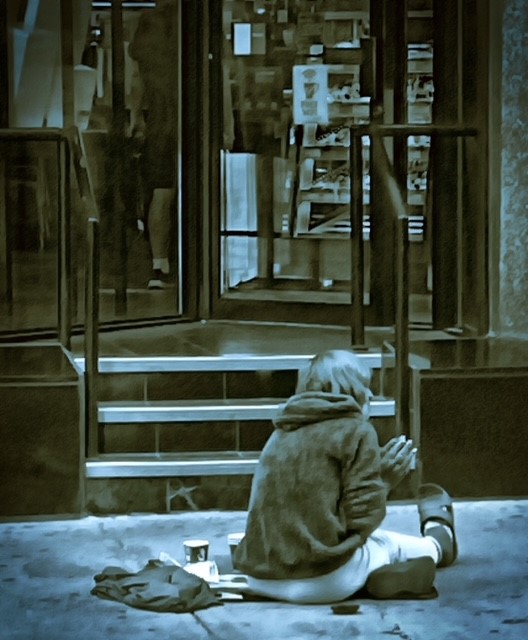© 2021 j.g. lewis
-
global warning
-
Ask The Impossible
Don’t talk to me at dawn. Caught up in whispers
of residual dreams beyond my control,
I’m not always ready for a new day, and
frequently have difficulty comprehending
where the night falls.Morning is not the time for words
if the night has come before. Every breath
a struggle. I wake. No heartbeat. No. No talk.
Blinded by sight and sound I won’t hear
the meaning, or the message.Give voice to my days instead, where I won’t
see your reflection, but will feel the wonder above
the cacophony and confusion
that terrorizes an otherwise
monotonous day.Evening’s long shadow laps up scraps
of humanity. I pay less and less attention as
the planets close in. Considering your many renditions,
I await your arrival. Any night. What shade
will you be this night?Then is the time, when distance fades, where we tell
each other stories. Little else matters, and we ask
the impossible. Inevitably darkness
consumes me, until you become
less significant.Through nights, when I’m restless, when dawn
is simply a concept, don’t waste your words on me.
I will not hear them, promises or otherwise,
or find the light, or time, to
see your lips move.Dawn reveals serious wounds, time misspent
and misplaced words. Where morning hints
of the night before and I may not hear your call,
don’t talk to me at dawn,
or talk to me at all.© 2015 j.g. lewis
-
More or Less
‘If you want to win the teddy bear, you have to break the rules.’
Advice from a panhandler, a regular,
outside one of two coffee shops. People come and go,
tedious ebb and flow of those getting by; life in this city.Daily she is here or there, barely warm coat,
hands clasped in prayer, paper cup and her frowzy blanket.Where she sleeps is often a wonder;
women’s shelter a block over, or congregated
rooming house. Downtown. There are many not far away.‘Any spare change, anything helps.’
Passersby, some smile, others won’t. Many don’t
look down. Not everybody stops, not everybody walks on by.
A quarter or two, a coffee or crumpet. Here and there.More or less.
‘God bless.’
Sight smile from an everyday face that has braved cold
winter winds, scorn and rejection. Her life harder than
the dirty concrete where she sits. Every day.Empty stomach. Little promise. Few possibilities.
Some other day.
Some other time, the world was different.So was I.
So was she.Society does what it does.
We rarely know
who breaks the rules and do not question those who make them.© 2021 j.g. lewis
April is Poetry Month
all poetry all the time
right here
poetry every day -
At Seventeen
It was never for the night, but only
for the summer. My seventeenth
summer. Never would I say it shouldn’t
have happened, because it did.
You with a past
I would certainly become a part of,
and I collecting stories. An identity.
At seventeen. You took a part of that;
of all, or whatever, went forward.
What I have become.
Bones are formed through experience,
shaping us emotionally, physically, and
psychologically. Down to the soul.
You were there. There I was,
not knowing what to expect, and you
expecting nothing but honesty.
I didn’t question your motives, nor did I
question mine. Age was not important,
you said, nor was intent.
There was a difference.
Seventeen years. but only one summer.
July heat, the scent of patchouli,
sandalwood and #5. Intoxicating.
I tasted the moon on your breath,
and witnessed the clouds in your eyes.
A sullen anger, a hurt from before, and
your impatient need to get over
the emotions. You talked about it.
I could only listen, or try, to understand.
At seventeen I could not know.
Yet. I would learn. Eventually.
In times of give and of take, we took
consciously. Each of us. Never a moment
of mixing the beginning up with the end.
We knew. I wouldn’t ask;
at seventeen you don’t. Of course,
I remember fireflies, the music, touch,
and the sense and secrets we rarely
acknowledged. Not enough time. Only
one summer. It was close, something
I had never had before, but it was not
friendship. A friend you would see again.
Not only for a summer.©2018 j.g. lewis
“It isn’t all it seems at seventeen”
-Janis Ian -
Again and Again
After rain, or tears, have extinguished
flames of many candles, diminished now
to stiff wax puddles from last night or
the one before that.Flowers wilted on the street, solemn vigil
is over, but anger remains. Community grief
is necessary. People hurt together, even
heal together. When allowed.Until next night, or the one after that. Another
mass shooting, traffic stop or another situation
where race meets hate. Another protest over
another death. Never changes.Again and again, lives once lived, stories told,
never-ending headlines. Grief forever knows
no boundaries. Another night, another life
gone. Hate makes waste.© 2021 j.g. lewis




